
Attachment Parenting and Intuitive Parenting: Read Your Child Rather Than Some Book!
In my experience attachment parenting is the easiest and simplest parenting style ever!
As parents, we only really need to do one thing:
- Deep bonding with our child
'Hmmm' ... you might say; 'Surely there must be more to this parenting style than just parental bonding!'
Yes, there is ... but bonding or 'attachment' comes first!
Attachment Parenting Is About Really Knowing Your Child
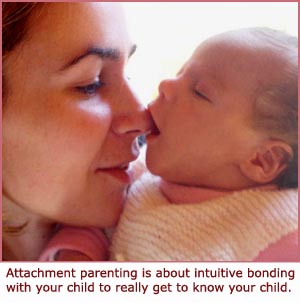
Bonding is not only a means to feel love and deep connection; it is also the most direct route to knowledge of your child's needs (I view my child's 'needs' as 'deposits' that regularly need to be 'refilled' with my touch, presence, understanding, acceptance, food etc.).
According to Clinical Professor of Pediatrics, Dr. Sears attachment parenting is about 'attaching', bonding and 'tuning' in to your child to really know your child.
To know when your child needs something and what it is he or she needs.
Attachment Parenting and Positive Parenting:
- Two Sides of the Same Coin!
The parenting styles of positive parenting and attachment parenting both share the goal of:
- Being fully present with you child, connecting to and fulfilling your child's needs ...
- ... to pave the way for the positive effects of secure attachment (secure attachment is one of four attachment styles, that attachment theory research mapped out a few decades ago) ...
- ... which leads to a happy, self confident and healthily independent child who has developed a good sense of basic trust in people and the world.
If we dig into the difference between attachment and positive parenting, positive parenting may be considered somewhat more 'mental' in attitude than attachment parenting.
What Is Positive Parenting?
- Respecting and Supporting Who Your
Child Is!
Positive parenting may be seen as more future orientated:
- 'Know' your child and focus on his or her strengths and abilities to bring out the best in him or her to build high self esteem.
What Is Attachment Parenting?
- Practical Child-Parent Relationship Building!
This parenting style may be viewed as more 'practical', intuitive and instinctual.
Attachment parenting is focused on developing and strengthening the natural and intuitive bond between close caregivers and their child in order for the them to subsequently act on the gained knowledge of needs ...
... which is not always easy!
Follow the Needs or Follow the Norms ...
- That Is the Question!
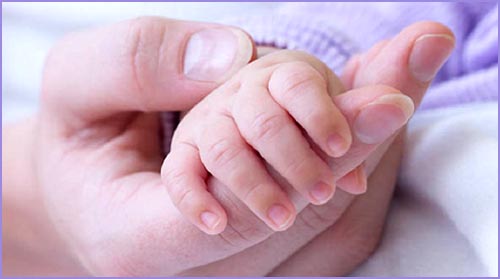
Why?
Because what you sense is the right thing for your child, may be 'counter to' what you're being told by well-meaning friends or respected child care professionals.
For instance, during the peak of my son's particularly intense, but completely normal baby separation anxiety phase, a typical piece of parenting advice I encountered time and time again was: 'Your child is too dependent on you. He needs to learn to face the world, roughen up and become more independent!'
Because of my son being what Dr. Sears would call a high need baby (a baby who is particularly sensitive, strong willed and intense in character), my son practically lived on me most of the first year.
Everything he did was on me, I was his mobile home.
This was tough, not only because my son seemed particularly demanding but because people kept questioning my choice of parenting as being too indulgent.
And for some time, I was mentally torn between 'follow the 'book' / parenting advice or follow my child and his needs?'
I ended up 'following' my child!
Why?
1. It just felt right!
2. Also simply because his need for intense, close physical and emotional contact was so overwhelming that I didn't really have the energy to NOT follow them, if you follow me :-)
Attachment Parenting Is Filling up Your Child's Backpack for Life with Trust and Security
So, interestingly, my child being a high need baby was really my luck. Without knowing about attachment theory, I quickly learned to read his specific needs and respectect them.I emphasize respect because when a child 'misbehaves', is 'needy' or irritatingly 'childish', it may be tempting just to ignore your child and hope it will all go away or to become angry to make your child instantly compliant.
But is this respectful?
Would we do this to an adult person?
To me, the word person is the key: Thinking of my baby, toddler, child as a person makes the answer really easy.
Respecting and fulfilling my son's needs as quickly and consistently as possible is my strategy.
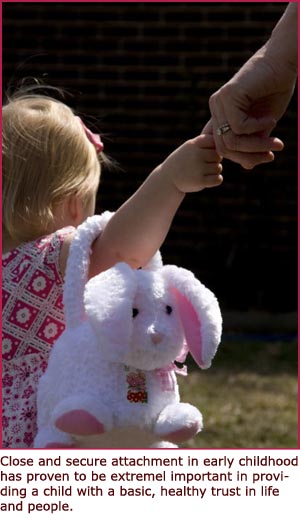 And as a toddler, my son still very much loves to cuddle, he actually respects my word when I deliver it with my full presence, he very seldom 'misbehaves' with me, when he is unhappy it is never for very long and he steadily becomes more and more independent of me, enjoying his own company.
And as a toddler, my son still very much loves to cuddle, he actually respects my word when I deliver it with my full presence, he very seldom 'misbehaves' with me, when he is unhappy it is never for very long and he steadily becomes more and more independent of me, enjoying his own company.
At first glance it may seem that 'obeying' all needs is spoiling my child - but this parenting style has nothing to do with spoiling children or permissive parenting.
Nothing whatsoever!
By close attachment and the consistent fulfilling of 'needs' (as distinct from 'wants') you give your child a chance to know the world from a secure base: for instance the safe haven of your hip or the calming presence of you sitting right next to him or her while he or she plays.
You provide your child with a basic trust in life, which Attachment Research has proven will to truly benefit him or her later in life:
"Pick them up quickly and they'll get down quickly. A child must go through a stage of healthy dependence in order to later become securely independent."
~ Dr. Sears ~ "
How Can General Parenting Advice Really Know Your Child?
- It Can't ... Only You Can!
As a parent, bonding with and tuning in to my son has become my absolutely most important tool in finding out why for instance he may be occasionally unhappy or misbehaving! (3 Simple Steps to Lovingly End Tantrums or Misbehavior.
Typical books about babies and children, cultural norms of 'good parenting' and friends' parenting advice can help you brainstorm and view possible explanations of why your child behaves in a certain way and what you may do to 'help' your child, BUT they cannot know your child - only you can!
Remember that!
Trust that!
And ... trust yourself and your gut feeling!
Consistently trusting your gut and acting accordingly is not always easy, I know!
But it really does make parenting easy!
I know, this seems paradoxical, but please, bear with me a little longer :-)
How on Earth Can 'Obeying' all Your Child's Needs Be Easy Parenting?

At first glance, it doesn't really make sense, does it?
But in my experience my child is / was never the problem, never! My head was!
Think about it ... When exactly is it that parenting seems so challenging (besides when we're falling apart from physical exhaustion)?
It is when in our heads we parents have fixed ideas that we take for granted about proper child discipline and child behaviour:
- For instance: 'Cosleeping is a really bad habit that will be impossible to get rid of'
- Or 'A baby should learn to fall asleep by himself',
- Or 'He must to learn potty training now, it's about time' etc.
Our ideas, our expectations, our presumptions make life really hard for us parents ... and for our kids, too.
Trying to make our child conform to our expectations instead of vice versa may feel like trying to put clothes on our child that don't fit because the pants have three legs and not two like our child.
Yes, this 'picture' is absurd but so are some of the ideas and expectations in our heads.
If we start paying attention to our expectations and look at them from a totally objective standpoint, we'll often find that they make no sense. It's just what we've been told is right. Right?
When my son was just a baby, I decided to pay attention to general parenting advice but NOT necessarily accept it.
However, I made a decision to accept whatever my child needed and not have too many expectations of how he ought to be.
Thinking that as a baby:
- He should sleep more and not wake up the minute I put him down
- He shouldn't need to eat every half hour
- He ought to be able to entertain himself alone for just five minutes
- He should be interested in toys and not just the fascinating face of Mom
and so on and so forth - only made me think:
- 'Was I doing something wrong?' and
'Is a baby supposed to be this challenging?'
But when I let go of these ideas of how things 'should' be - being a mom became a lot easier.
Having a Clean Mental Slate!
To me, practicing attachment parenting meant having a 'clean mental slate' and no expectations for as long as a certain challenging phase would last.
Luckily everything challenging with children is periodic, always.
With the expectations of what I dreamed I could do on maternity leave gone, I could start to enjoy just being there.
What a relief!
And what a blessed silence in my head!
Interestingly, a friend of mine said recently:
'When I accepted that I couldn't leave my baby on the floor alone for 2 seconds and had to sit with her for hours on end, life in my head became so much more satisfying because I didn't need to be anywhere else!'
When she not only listened to her child but fully accepted her child's needs and acted accordingly, life was so much better; both for mom and for baby.
Even if the dishes ruthlessly just continued to pile up in the kitchen!
Full ACCEPTANCE of What We Read in Our Child Is the Challenge!
When we bond and actually accept the knowledge we gain - even when it challenges our preconceived ideas about e.g. proper and correct bedtime manners and hours, cosleeping, extended breastfeeding, age for potty training, 'crying it out' etc.) - life as a parent becomes so much easier, and your child so much happier.
Without a doubt, it did that for me!
When I accepted for instance:
- That my child needed to fall asleep with me by his side ...
- That when he was a baby, I had to carry him around everywhere in a sling on my hip - even when cooking, doing laundry, shopping etc. ...
- That I could only eat with one hand because my son slept on the other (he would wake the instant I put him down) ...
- That I had to 'go out' (i.e. get out of the house) a lot so he could experience newness so that he wouldn't be impossibly demanding because he was bored ...
... parenting in itself was, and still is, a piece of cake - no expectations, no rigid child discipline ... only my child!
(I know fitting all your child's needs into a hectic everyday life is a real challenge, but there are ways to get through that also.
In my parenting article: The Simple Two Step Recipe We All Want: How to Respect Your Child without Compromising Yourself! I explain, among other things, how you may still meet your adult responsibilities (e.g. getting to work on time) while at the same time still fully respecting and meeting your child's needs.)
One may say that attachment parenting is forgetting about the pre-learned child discipline rules so you can actually feel what it is your child really needs.
Or in other words:
Attachment parenting is what we naturally and instinctively do when we don't spend time in our heads debating what we 'should' be doing.
So, to sum up, it is really, really simple:
- connect, feel, know and respond.
That's It! Really! :-)
Your Positive Parenting Ally,
Birgitte

Want to stay in touch and get the latest news?
Sign up
for my free newsletter
Parent Coaching
- For Inner Peace, Clarity and a Deeper Connection to Your Child
 Being a parent can feel like a double-edged sword. Life with kids may feel like the greatest gift you have ever received, while at the same being hugely challenging, often leaving you confused, stressed and overwhelmed.
Being a parent can feel like a double-edged sword. Life with kids may feel like the greatest gift you have ever received, while at the same being hugely challenging, often leaving you confused, stressed and overwhelmed.
When we feel like this, we've lost touch with ourselves. We can't hear our own inner voice, and it's difficult to know what is 'right' for us and how to act.
I offer in-depth parent coaching to help you regain your balance and get back in touch with yourself. From a place of inner peace and clarity, your will find your own answers which will help you reconnect with your child from a place of unconditional love and acceptance.
Read more about my parent coaching here.
Where Would You Like to Go Next?
Attachment Parenting Articles
 What Is Attachment Parenting? 10 Sharp Truths and 2 Common Misconceptions! |
Attachment Theory Articles (Scientific Angle)
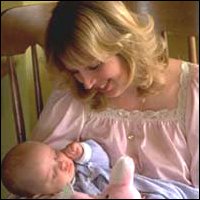 Attachment Theory is Good Basic Knowledge ... But Misses Out on Individual Infant Temperaments! |
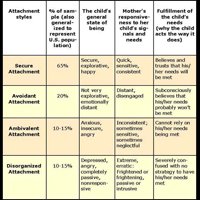 The Four Infant Attachment Styles: Straight to the Point, Quick Understanding! |
 Psychology Attachment Behavior; Find out When to Expect the Constant Clinging or the Letting Go of Mom's Skirt! |
 Secure or Insecure Attachment in Infancy ... Largely Shapes Who We Are Today! |
Attachment Experts
 John Bowlby: The Father of Attachment Theory |
 Mary Ainsworth: The Refiner of Attachment Theory |
 Deep Insights into the Essence Dr Sears' Attachment Parenting along with a Fascinating Historical View on the Slow Rising Consciousness of Attachment Parenting |
Attachment, High Need and Separation Anxiety
 A High Need Baby: A Strong Personality Is Great, But Where's the Off Button? |
 Baby Separation Anxiety The More Your Baby Clings, the More You Let Him! 10 Tips to Ease Baby Separation Anxiety |
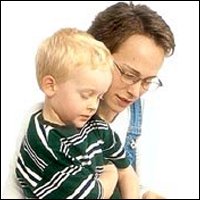 Valuable Insights into Separation Anxiety in Children and Babies: Meet Your Child with Full Acceptance and Deep Connection! |
 Facts and Fiction about the Controversial Ferber Method along with a Discussion of Its Potential Long Term Consequences |
Back to the top of this page about Attachment Parenting and Intuitive Parenting: Read Your Child Rather Than Some Book!
Go to the Positive Parenting Ally Homepage







